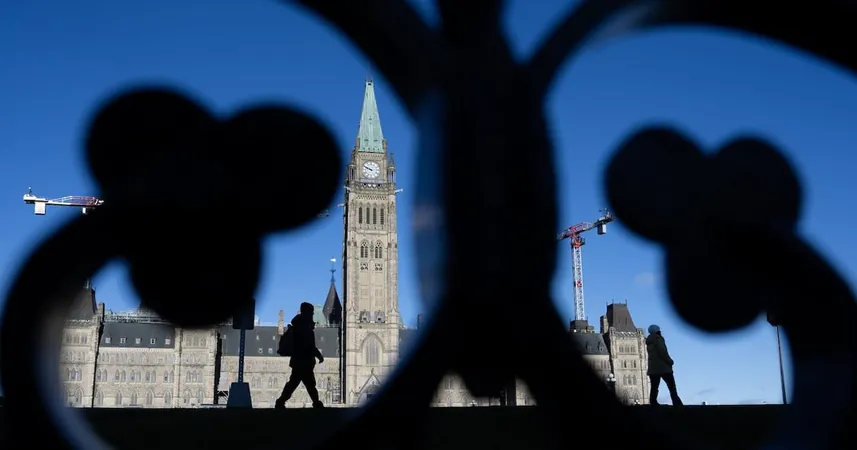
Major Shift in Canadian Pension Investments: Ottawa's Bold Bet Amidst U.S. Trade Tensions!
2024-12-16
Author: Michael
Introduction
In a bold maneuver aimed at enhancing domestic investment, the Canadian federal government revealed plans to lift limits on pension fund investments in Canadian companies during its latest fiscal update. This comes amidst political turmoil in Prime Minister Justin Trudeau’s cabinet and escalating trade threats from the United States, making this announcement a critical point in Canada’s economic strategy.
Elimination of Investment Caps
On Monday, the government unveiled its fall economic statement, signaling its intent to eliminate the 30 percent cap currently imposed on investments that Canadian pension funds can make in domestic entities. The move is designed to boost the ability of these funds to engage more significantly in the Canadian market, thereby spurring economic growth.
“This initiative will simplify processes for Canadian pension funds, enabling them to make substantial investments in our homegrown businesses,” the government outlined in its statement. Furthermore, consultations will be held with provincial governments to address how this change will impact provincially regulated pension plans.
A Tumultuous Political Landscape
The timing of this announcement was notable as it followed the abrupt resignation of Finance Minister Chrystia Freeland, who indicated in her letter that she was offered a different cabinet role just hours before the fiscal update. In her parting words, Freeland articulated her concerns about the potential economic risks posed by U.S. President-elect Donald Trump’s impending tariff strategies. She emphasized the need for Canada to maintain its fiscal stability and steer clear of 'political gimmicks' that could jeopardize its economic standing.
The government's announcement to remove the cap reflects a growing trend of 'economic nationalism' where countries are fiercely vying for capital investment. Freeland stated, 'Canada must intensify its efforts to attract capital,' highlighting the critical role domestic investments play in securing the economic future of Canadians.
Boosting Domestic Investment
The government is not stopping at the pension fund changes. As part of its strategy, it is also considering lowering the 90 percent cap that restricts municipal-owned utility companies from attracting more than a 10 percent private ownership share. By adjusting this threshold, pension funds could gain a larger stake in municipal utilities, facilitating greater access to capital to expand infrastructure—essential for meeting future energy demands.
To enhance transparency further, Ottawa is proposing regulations requiring the Office of the Superintendent of Financial Institutions to disclose the investment distribution of federally regulated pension plans with assets exceeding $500 million. This move aims to foster greater trust and accountability in pension fund operations.
Additionally, the government plans to launch a $1 billion fourth round of the Venture Capital Catalyst Initiative next year, offering more attractive terms for institutional investors, including pension funds. This initiative aims to promote innovation by ensuring adequate funding for start-ups and expanding businesses.
Navigating Trade Tensions with the U.S.
These sweeping changes come at a time when Canada is gearing up to defend itself against potential trade tariffs threatened by the incoming U.S. administration. Freeland accused Trump’s administration of purposefully creating economic uncertainty to deter investments outside the U.S. 'Canada will not stand idly by. We are committed to protecting Canadian jobs and interests,' she declared.
The proposed fiscal measures, including a $1.3 billion investment in border security over the next six years, signify Canada's readiness to respond assertively against the backdrop of U.S. trade threats. Concurrently, provincial leaders are contemplating their responses, with mixed signals about potential retaliatory tariffs on energy exports.
Economic Forecast amid Uncertainty
As the Canadian economy braces for the potential impact of tariffs, economists remain cautious about the future. James Orlando from TD Economics recently stated the looming tariffs could spell severe repercussions for Canada’s economy, potentially leading to stagnation or even recession. With the unpredictability of the incoming U.S. administration, the federal government’s fall economic statement reflects a proactive approach to safeguard its economic interests.
Canada is undoubtedly at a pivotal moment, balancing domestic investment strategies while navigating the turbulent waters of international trade. As these policies unfold, all eyes will be on Ottawa to see if they successfully bolster the economy and shield it from external threats!









 Brasil (PT)
Brasil (PT)
 Canada (EN)
Canada (EN)
 Chile (ES)
Chile (ES)
 España (ES)
España (ES)
 France (FR)
France (FR)
 Hong Kong (EN)
Hong Kong (EN)
 Italia (IT)
Italia (IT)
 日本 (JA)
日本 (JA)
 Magyarország (HU)
Magyarország (HU)
 Norge (NO)
Norge (NO)
 Polska (PL)
Polska (PL)
 Schweiz (DE)
Schweiz (DE)
 Singapore (EN)
Singapore (EN)
 Sverige (SV)
Sverige (SV)
 Suomi (FI)
Suomi (FI)
 Türkiye (TR)
Türkiye (TR)